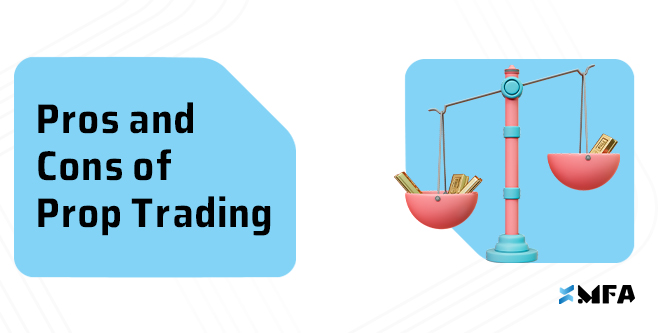Introduction | Prop Trading: A Golden Opportunity or a Hidden Trap?
These days, “prop trading” is everywhere—from YouTube and TikTok to Instagram and Telegram. Everywhere you go, traders and influencers are saying:
“Trade without your own money and earn real profits!”
It sounds exciting. But here’s the real question: Is prop trading truly the best path for traders? Or is it just another hyped-up trend that hides real risks?
In this comprehensive guide by MFA Signals, we break down the real benefits and drawbacks of prop trading so you can make an informed, strategic decision.
What Is Prop Trading?
Prop trading (short for proprietary trading) is when you trade using a company’s capital, not your own money.
The process is simple:
• You take a trading challenge (demo test)
• If you meet the rules and prove your skills, you’re given a funded account
• From then on, you trade live—and earn a profit share (typically 70–90%) while the firm takes the financial risk
You keep the profits. The company provides the capital. But it only works if you follow the rules.
Top Advantages of Prop Trading
1. No Need for Personal Capital
The biggest benefit? You don’t need thousands of dollars to get started. If you prove your ability, you can manage a $10K, $50K, or even $200K account.
2. Real Income Without Personal Financial Risk
Since the capital is not yours, you don’t lose your savings in case of failure. Worst-case scenario? Your funded account is closed—but your own money stays safe.
3. Fast Growth with Large Capital
In a personal account, earning 5% on $500 = just $25/month.
In a prop account, 5% on $50,000 = $2,500/month.
Same skills, bigger rewards.
4. Build a Verified Trading Track Record
Succeeding at a prop firm gives you real credibility. You can show performance history to future investors, job opportunities, or even other firms for scaling.
5. Professional Discipline
Prop firms force you to:
• Use stop losses
• Manage risk properly
• Avoid overtrading
• Stick to your trading plan
This helps you develop into a professional—not just a lucky trader.
Top Disadvantages of Prop Trading
1. Pressure from Strict Rules
Even skilled traders can lose their accounts from one mistake—like violating daily drawdown limits (e.g., losing more than 5% in one day).
Profit or not, rules come first.
2. Limited Freedom in Trading Style
Many firms ban:
• News trading
• Martingale strategies
• Scalping
• Overnight positions
If your strategy depends on flexibility, this may be a problem.
3. Dependency on the Firm
Your account is tied to the company. If the firm changes policies, shuts down, or delays payouts—you’re stuck.
Choose reputable prop firms with stable systems.
4. Platform Lag or Execution Issues
Some low-quality firms use slow servers or outdated platforms. For fast-moving strategies (like scalping), this can ruin trades.
5. Psychological Disconnect from Risk
Since it’s not your money, you might take trades more carelessly. This can build bad habits and damage your long-term discipline.
Prop Trading vs. Personal Trading
| Factor | Personal Account | Prop Trading |
| Capital Requirement | Required | Not required |
| Financial Risk | 100% personal | Zero personal risk |
| Trading Style Flexibility | High | Limited |
| Growth Potential | Slow | Fast |
| Rule Pressure | Low | High |
| Resume/Career Impact | Minimal | Strong |
Is Prop Trading Right for You?
| Your Situation | Is Prop a Good Fit? |
| Skilled but lack capital | Yes — it’s perfect |
| Want fast growth and income | Yes — with discipline |
| Still trading emotionally | No — more practice needed |
| Struggle with risk management | No — likely to fail |
| Want total freedom in your trading style | No — may feel restrictive |
Final Verdict | Prop Trading = Opportunity with Responsibility
Prop trading is a serious opportunity—but it’s not magic.
If you have the skill, the discipline, and a plan—you can scale faster than with any personal account.
But remember: the same rules that offer growth will remove you if ignored.
This isn’t a get-rich-quick scheme. It’s a performance-driven system with real rewards for real consistency.
You bring the skill. They bring the capital. But the discipline? That’s 100% on you.
FAQs | Common Questions About Prop Trading
1. Is prop trading a reliable income source?
Yes—if you’re consistent and follow the rules, it can provide stable income.
2. Is prop trading good for beginners?
Not really. You need experience, structure, and mental control. Practice in demo first.
3. Can I trade for multiple prop firms at once?
Yes—but only if you can manage them without conflict or burnout.
4. How long until I earn my first payout?
Usually 30–60 days after passing the challenge, depending on firm policy.
5. Which prop firms are good for Iranian traders?
MFA will publish a full comparison soon with options that support Iranian users.

